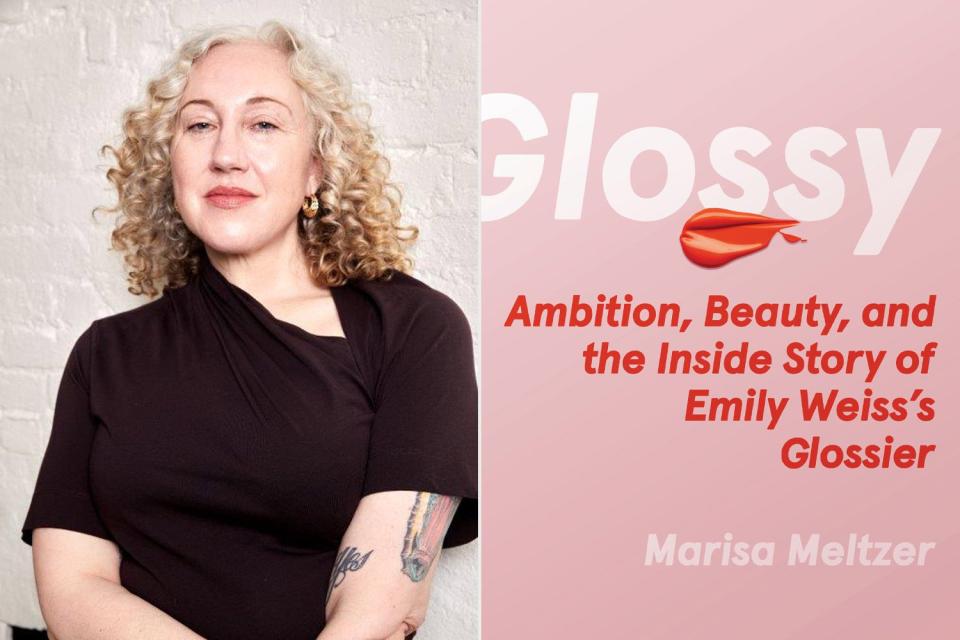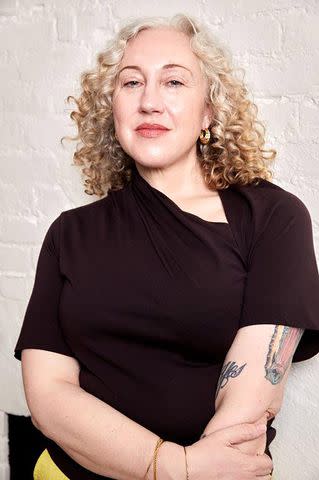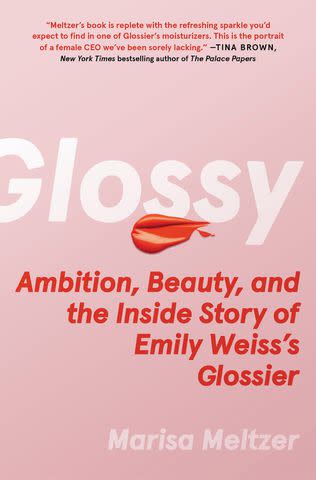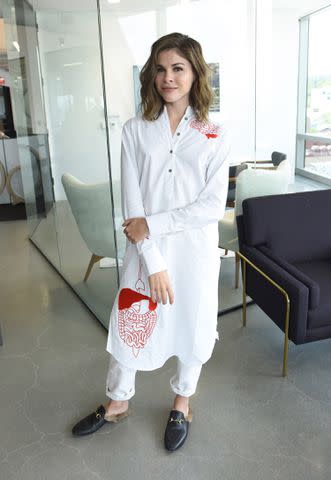Glossier Secrets: What Went Wrong (and Right) Inside the $1 Billion Beauty Brand (Exclusive)
In 'Glossy: Ambition, Beauty, and the Inside Story of Emily Weiss’s Glossier,' excerpted here exclusively, Marisa Meltzer tracks how an intern on 'The Hills' created a juggernaut makeup brand

Jamie Magnifico; Courtesy of Simon & Schuster
Once upon a time, Glossier was a unicorn. Which is to say, the beauty brand founded by former The Hills intern and Into the Gloss blogger Emily Weiss was a privately owned startup worth $1 billion. The story behind it all — how a blogger became a billionaire, how a beauty brand capitalized on millennial pink, how one young woman leveraged her coolness all the way to Silicon Valley and back, how it all went awry — has been a topic of business leaders, beauty editors, and makeup fans everywhere. And now, there’s a book about it all. The beginning and, some say, end of an era.
In Glossy: Ambition, Beauty, and The Inside Story of Emily Weiss’s Glossier, journalist Marisa Meltzer examines Glossier, a beauty brand that Forbes once described as “one of the most disruptive brands in beauty.” Known as much for its $18 Boy Brow pomade (for your eyebrows) as its initial direct-to-consumer approach and sophisticated and canny approach to advertiser and influencer marketing, Glossier burned through the zeitgeist starting in 2014 with a mere four products. What took place over the next seven years, as it raised more and more money (reached a $1.7 billion valuation) and gained more and more fans — and see a flagship store open in New York City with celebrity guests, see excerpt below — was nothing short of spectacular. And, it seems, unsustainable. During the pandemic, stores were closed, employees were laid off, there were allegations of a toxic and racist work culture, and Weiss would see a spoof of her Into the Gloss blog, with an Outta the Gloss Instagram grievance account. (Perhaps even more painful for Weiss, her products would be sold at discount stores such as TJ Maxx.)
What went wrong? Meltzer, who interviewed and shadowed Weiss many times, says, “Glossier didn't want to just be a beauty company, that wasn't enough. They wanted to be a brand you'd wear a sweatshirt for, or to be a tech brand. The sweatshirts were a hit but they never did get the tech part together. I think it's a good reminder that anyone or anything that feels like a juggernaut or untouchable can and probably will eventually be brought down to Earth.” She’s still a fan of the brand, though. “I remember first seeing Emily, On The Hills as The Superintern,” she says. “I was addicted to the show like everyone I knew and was completely taken by this brunette from New York who showed up to basically show Lauren Conrad how it was done. What kind of college student knows how to correctly identify chinoiserie? And I wear Glossier’s perfume, You, daily. It's subtle so sometimes I layer it with other scents too. It's like the no-makeup makeup of fragrance.”
Related: See WNBA Players Get Their Glow On in Glossier's Campaign for Its First Foundation (Exclusive)

Jamie Magnifico
Marisa MetzlerAsked if she’s heard from Weiss lately, Meltzer says: “I asked for her or a rep from Glossier to tell me if they've read it, thoughts, future plans, and all of that and never received a response. I would be surprised if she hasn't read it, though.”
Here, an exclusive excerpt from Meltzer’s book, Glossy: Ambition, Beauty, and The Inside Story of Emily Weiss’s Glossier.
Emily Weiss was wearing a tuxedo with no shirt underneath. The intern on The Hills and beauty blogger turned beauty entrepreneur and Wall Street wunderkind greeted VIP guests as they walked up a red quartz staircase to find five-foot-tall tubes of Boy Brow ready to pose with and a party photographer ready to capture it all. The air was lightly scented with Glossier You, and the mood was buoyant by design at the opening party in November 2018 for Glossier’s first permanent Manhattan flagship store. There were magazine editors there and Glossier employees, but the highlight in terms of celebrity wattage was when the crowd parted so Weiss could more easily lead Serena Williams and her husband, the Reddit cofounder Alexis Ohanian, on a tour of the space. The next morning Williams posted a snapshot of the night to her Instagram account with the caption “Bossed up with @emilyweiss.” It felt like a microcosm of the company’s success. And it’s success had been rapid: from a blog in 2010 to product launch in 2014 to now on the verge of a $1 billion valuation.
Weiss viewed the stores as a physical unboxing that needed to please and surprise customers. The flagship was built to incite maximum Instagram engagement. One room was called the wet bar and was set up like a women’s public restroom with skincare products lined up next to the sink and large mirrors on the wall. Another room had a red banquette in the shape of lips. You might as well call it a propaganda machine. A glittery and pink and pleasurable one. Weiss called the flagship store “Adult Disneyland.”
This was the peak and pinnacle of Glossier, before the pandemic when a third of its workforce was laid off, before allegations of a toxic workplace and lack of product innovation. This was the moment when Weiss was sending out the signal that she and her company were fully committed to the big time. In the years since her blog, Into the Gloss, became a beauty brand, she had amassed even more high-powered fans as the financial market began taking it seriously. Beyoncé, Serena Williams, Michelle Obama, Alexandria Ocasio-Cortez, and the US women’s soccer team during their apotheosis as role models were all members of “Generation G.” Reese Witherspoon wore Glossier makeup to the Oscars. They were minting smiles and money.
Related: Olivia Rodrigo Named Glossier's First Celebrity Face: Inside Her Debut Campaign
Weiss graced the cover of Time magazine as one of the Next 100 Most Influential People in November 2019. That was after she had been on the cover of Fast Company and Entrepreneur, and made Forbes’s 30 Under 30 list. She occupied a cult of personality even among her own girlboss cohort. Leandra Medine said, of her media company Man Repeller’s inception, “I think it started with Into the Gloss because I was like, ‘Oh wow, look at how Emily is, like, growing her one-person blog into a media company, I can do that too.’ And then after she launched Glossier, I was like, ‘Hmm, I don’t know about that.’ "

Courtesy of Simon & Schuster
'Glossy: Ambition, Beauty, and the Inside Story of Emily Weiss's Glossier' by Marisa MeltzerFrom a financial standpoint, Glossier was continuing to gain steam—and gaining the attention of venture capital firms as it pursued its next rounds of funding. Weiss was good in the room, and that early on, a lot of fundraising was about getting people to believe in her potential. Weiss was always good at selling herself, but she had gotten better at selling her sharpened vision of her company’s plan.
The gross profit margins for beauty are high. Glossier’s were about 80 percent, according to more than one former employee. As face wash does not cost a lot to make—the real cost is in the marketing—and beauty companies have the potential to scale, both of which are attractive to venture capitalists. The money allowed them to expand office space, add forty employees, and launch a dozen products.
If funding had been tricky in Glossier’s initial seed rounds, it was getting easier. In fall 2016, Glossier raised another $24 million in Series B financing. For its Series C in early 2018, the round added $52 million in investment. That same year, Bloomberg reported that Glossier had crossed into $100 million in revenue and brought on one million new customers. And those customers wanted to shop IRL.
Retail employees were called offline editors, in a confusing nod to Weiss’s former editorial world (those in customer service were “online editors”), and wore light-pink jumpsuits with stickers that declared their preferred pronouns. The job listings for retail were posted on Instagram—a savvy way to hire existing fans—and were treated like casting calls. The first round was a self-taped video, like an audition. A lot of them consisted of Weiss superfans who said she was their idol.
If a candidate made it to the second round, there was a phone call with a store manager. The biggest red flag at that stage was a reluctance to talk—a surprisingly large number of candidates wouldn’t pick up the phone and would respond that they’d prefer to do the interview over text message, which didn’t bode well for a job in retail. The third round was in person.
They were asked questions such as “How do you envision Glossier benefiting from your experience?” The pay at Glossier’s retail shops was competitive, around $20 per hour depending on the level of seniority and the city, with benefits if they worked full-time. The lucky few who made the cut got to experience orientation, Glossier-style. They passed around a Body Hero lotion and made orgasm noises over how good the white flower scent was. “They just needed to convince these twentysomething girls this was the best scent ever to sell products. I loved it at the time, but it now smells overly synthetic and gross to me, which is an apt metaphor for my experience,” said one retail employee.

Vivien Killilea/Getty
Glossier Founder and CEO Emily WeissTo work in the Glossier store felt like joining a sorority or becoming a Playboy Bunny if it was still cool and not creepy. They were offered free facials by nearby salons, and bakeries in the neighborhood would send over cupcakes for the crew. The other editors were each other’s new best friends, their favorite group chat, their future bridesmaids. They were the people they went with to rooftop bars or Shake Shack or to get vegan Mexican food.
The stores had a standard operating procedure for celebrities or VIPs or anyone famous who came in (the definition of fame getting murkier each year), with the manager told to make sure the person had a good experience, and to use their own judgment if someone asked for free products. Once a thirteen-ish Apple Martin, daughter of Gwyneth Paltrow and Chris Martin, came into the New York store and piled up a bunch of products, then had her credit card declined. She shrugged it off casually and slunk over to the elevator empty-handed. Another time Leandra Medine came into the LA store. “She poked around like everything was radioactive and left,” one retail employee said.
Related: Rosie Huntington-Whiteley Launches Beauty Series Feat. Kylie Jenner, Glossier's Emily Weiss and More
Not everyone who worked retail was on equal footing. Whether Emily Weiss personally followed you was a source of competition, and extra points if she commented on your posts. “A month or two in, we were having our morning meeting and were informed they were going to have a photo shoot starring our offline editors,” says one former editor. “It was like getting Tyra Mail on America’s Next Top Model.” They all tried to submit the most beautiful yet carefree selfie. The most beautiful girls were chosen, and the ones with the largest social media following.
And then there were the regulation pink jumpsuits, or, as in the first pop-up launch Glossier did for retail, its sales staff wore custom-dyed pink lab coats à la Clinique. “We always talked about taking something utilitarian and making it Glossier,” said Weiss. The baggy coats made everyone lose their figures, so sometimes they wore them unbuttoned with a shirt underneath, or tied at the waist—anything to change it up. There was an informal competition over who could tie the arms around the waist the tightest. One girl was celebrated among her peers for being able to loop the sleeves around her waist twice.
Glossier reached a valuation of $1 billion in March 2019. They reached it after closing a $100 million Series D funding round led by the most legendary Sand Hill Road firm, Sequoia Capital, an investor in Apple, Google, PayPal, Zoom, Reddit, and Snap (and also Sam Bankman-Fried’s tarnished crypto company FTX). Weiss compared being funded by Sequoia to being accepted into Harvard, and Glossier was only the firm’s second investment in beauty after Charlotte Tilbury in 2017. “Raising the hundred million is a strategic decision on our part to facilitate even bigger, faster growth of the company,” Weiss said. “It is fuel in the tank, it’s like going to a gas station and getting, like, what’s the best kind of premium gas? That’s what we just got.” Glossier had just become a unicorn.
For more People news, make sure to sign up for our newsletter!
Read the original article on People.

 Yahoo News
Yahoo News 
